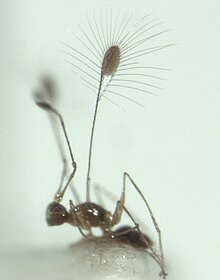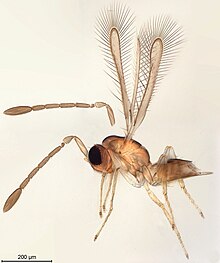മൈമറിഡെ
| Mymaridae | |
|---|---|

| |
| Mymar sp. (female) | |
| ശാസ്ത്രീയ വർഗ്ഗീകരണം | |
| Domain: | Eukaryota |
| കിങ്ഡം: | Animalia |
| Phylum: | ആർത്രോപോഡ |
| Class: | പ്രാണി |
| Order: | Hymenoptera |
| Superfamily: | Chalcidoidea |
| Family: | Mymaridae Haliday, 1833 |
| Type genus | |
| Mymar Curtis, 1829
| |
| Genera | |
|
See text | |
| Diversity | |
| 0–2 subfamilies c. 100 genera c. 1,400 species | |
ഉഷ്ണമേഖലയിലും മധ്യ ഉഷ്ണമേഖലയിലും കാണപ്പെടുന്ന ചാൽസിഡോയിഡിയ കടന്നൽ അതികുടുംബത്തിലെ ഒരു കുടുംബമാണ് മൈമറിഡെ - Mymaridae. നൂറോളം ജനുസുകളിലായി ഇവയുടെ 1400-ഓളം ഇനങ്ങളെ ഇതുവരെ കണ്ടെത്തിയിട്ടുണ്ട്.
തീരെ ചെറിയ ഈ പ്രാണികളുടെ നീളം 0.5–1.0 മി.മീ (0.020–0.039 ഇഞ്ച്) മാത്രമാണ്. ലോകത്തിൽ ഇതുവരെ കണ്ടെത്തിയിട്ടുള്ളതിൽ ഏറ്റവും ചെറിയ പ്രാണിയായ ഡൈകൊപൊമോർഫ എക്മെപ്റ്റെറിജിസ് ഈ കുടുംബത്തിലുള്ളതാണ്. ഇവയ്ക്ക് പൊതുവേ കറുപ്പോ, മഞ്ഞയോ നിറമാണ്. ഇവയുടെ പെൺ വർഗ്ഗങ്ങളുടെ ആന്റീനയുടെ തുമ്പ് ക്ലബ്ബ് പോലെയിരിക്കും. ലോലമായ ചിറകുകൾ ആണ് ഇവയ്ക്കുള്ളത്. ഇവ വളരെ സാധാരണമാണെങ്കിലും വലിപ്പക്കുറവു കാരണം മനുഷ്യരുടെ ശ്രദ്ധയിൽ പെടാറില്ല. ഇവയുടെ ഇമാഗോയുടെ ആയുർദൈർഘ്യം ഒന്നോ രണ്ടോ ദിവസങ്ങൾ മാത്രമാണ്. ഇവ മറ്റു പ്രാണികളുടെ മുട്ടയിലാണ് പരാദമായി പ്രത്യുൽപ്പാദനം നടത്തുന്നത് എന്നതിനാൽ നല്ലൊരു ജൈവകീടനിയന്ത്രണ സഹായി ആണ്. തുടക്ക ക്രിറ്റേഷ്യസ് കാലഘട്ടം മുതലുള്ള ഇവയുടെ ജീവാശ്മം കണ്ടെത്തിയിട്ടുണ്ട്.
ജൈവവർഗ്ഗീകരണം
[തിരുത്തുക]
1833-ൽ അലക്സാണ്ടർ ഹെൻറി ഹാലിഡെ എന്ന ഐറീഷ് പ്രാണിപഠനശാസ്ത്രജ്ഞനും അദ്ദേഹത്തിന്റെ സുഹൃത്തുക്കളായിരുന്ന ജോൺ കർട്ടിസ്, ഫ്രാൻസിസ് വാക്കർ എന്നിവരും ചേർന്നാണ് ഈ കുടുംബത്തെ നിർവചിച്ചത്.[1][2][3][4][5][6][7][8]
പദോൽപ്പത്തി
[തിരുത്തുക]പുരാതന ഗ്രീക്ക് പദമായ μΰμαρ (mumar), അതിന്റെ വകഭേദമായ μῶμος (mōmos, "spot", "blame"), എന്നിവയിൽനിന്നാണ് കർട്ടീസ് ഈ പേര് രൂപപ്പെടുത്തിയത്.[5]
ആവാസവ്യവസ്ഥ
[തിരുത്തുക]ഉഷ്ണമേഖലയിലും മധ്യ ഉഷ്ണമേഖലയിലും ഉള്ള മരുഭൂമി മുതൽ മഴക്കാട് വരെയുള്ള എല്ലാ ആവാസവ്യവസ്ഥയിലും ഇവ കാണപ്പെടുന്നു.[9] കുറെയിനങ്ങൾ കുളങ്ങൾ, അരുവികൾ തുടങ്ങിയ ശുദ്ധജലാശയങ്ങളിൽ ജീവിക്കുന്നവയാണ്.[10] ചിറകുകൾ ഉപയോഗിച്ചു അവയ്ക്കു തുഴയാൻ കഴിയും.[11] 15 ദിവസങ്ങൾ വരെ വെള്ളത്തിൽ കഴിയാനുമാകും.[12][13][14]

മറ്റു പ്രാണികളുടെ മുട്ടകളിൽ ആണ് ഇവ മുട്ടയിടുക.[15][16][17][18][9][19][20][21][9][4][22][23] ഇവയുടെ ജീവിതചക്രത്തെക്കുറിച്ചു ഒരുപാടൊന്നും അറിവില്ല.[17] മുട്ട വിരിഞ്ഞിറങ്ങിയാലുടനെ ഇണചേരുന്നു.[24][25] ചിലപ്പോൾ മുട്ട വിരിഞ്ഞിറങ്ങുന്നതിനു മുൻപുതന്നെ ഇണചേരൽ നടക്കുന്നു.[24][26] പെൺകടന്നലുകൾ വിരിഞ്ഞിറങ്ങിയാലുടനെതന്നെ മുട്ടയിടാൻ ഉചിതമായ മറ്റു പ്രാണികളുടെ മുട്ടകൾ കണ്ടെത്താനുള്ള ശ്രമം തുടങ്ങുന്നു. തങ്ങളുടെ ആന്റീന ഉപയോഗിച്ചു ചെടികളിൽ തട്ടിനോക്കി മറ്റു പ്രാണികൾ മുട്ടയിട്ട സുഷിരങ്ങൾ കണ്ടെത്തുന്നു. അതിനുശേഷം ആന്റീന ഉള്ളിൽ കടത്തി ഉള്ളിലുള്ള മുട്ടകൾ ഉചിതമാണോ എന്നു പരിശോധിക്കുന്നു. ആണെങ്കിൽ തങ്ങളുടെ ഓവിപ്പോസിറ്റർ ഉപയോഗിച്ചു ഓരോ മുട്ടയിലും തങ്ങളുടെ മുട്ട നിക്ഷേപിക്കുന്നു. ഇങ്ങനെ ഏകദേശം നൂറോളം മുട്ടകൾ ഇടുന്നു.[26][27] ആറു മണിക്കൂർ മുതൽ രണ്ടു ദിവസങ്ങൾക്കുള്ളിൽ ഈ മുട്ടകൾ വിരിയുന്നു.[25][9] ഇവയ്ക്ക് രണ്ടോ മൂന്നോ ലാർവ ഘട്ടങ്ങൾ ഉണ്ട്.[15][28] അതിനുശേഷം ആതിഥേയ മുട്ടക്കുള്ളിൽവച്ചുതന്നെ രൂപാന്തരീകരണം നടക്കുന്നു.[9]
അവലംബം
[തിരുത്തുക]- ↑ Kari T. Ryder Wilkie. "Francis Walker (1809–1874)". Global Ant Project – World Ant Taxonomists. Archived from the original on 2013-11-01. Retrieved 2018-11-27.
- ↑ L. Watson; M. J. Dallwitz. "British Insects". DELTA, Institute of Botany, Chinese Academy of Sciences. Archived from the original on 2019-10-08. Retrieved 2018-11-27.
- ↑ "Letters from Francis Walker to Alexander Henry Haliday (July 29, 1839)". Wikisource.
- ↑ 4.0 4.1 John S. Noyes. "Dicopomorpha echmepterygis (Female with "large" male inset. Slide-mounted museum specimen.)". Universal Chalcidoidea Database, The Natural History Museum.
- ↑ 5.0 5.1 John T. Huber (2005). "The gender and derivation of genus-group names in Mymaridae and Mymarommatidae (Hymenoptera)" (PDF). Acta Soc. Zool. Bohem. 69: 167–183. ISSN 1211-376X. Archived from the original (PDF) on 2021-02-27. Retrieved 2018-11-27.
- ↑ Francis Walker (1846). "Descriptions of Mymaridae". Annals and Magazine of Natural History. XVIII (116): 49–54. doi:10.1080/037454809494390.
- ↑ Alexander Henry Haliday (1833). "An essay on the classification of the parasitic Hymenoptera of Britain which correspond with the Ichneumones minuti of Linnaeus". The Entomological Magazine. 1.
- ↑ "Helios". Natural History Museum.
- ↑ 9.0 9.1 9.2 9.3 9.4 Elisabetta Chiappini; John T. Huber (2008). "Fairyflies (Hymenoptera: Mymaridae)". In John L. Capinera (ed.). Encyclopedia of entomology. Springer. pp. 1407–1409. ISBN 978-1-4020-6242-1.
- ↑ Seguei V. Triapitsyn; Ranyse B. Querino; Malu C.B. Feitosa (2008). "A New Species of Anagrus (Hymenoptera: Mymaridae) from Amazonas, Brazil" (PDF). Neotropical Entomology. 37 (6): 681–684. doi:10.1590/s1519-566x2008000600009.
- ↑ Gilbert Waldbauer (2008). A Walk Around the Pond: Insects in and Over the Water. Harvard University Press. pp. 25–26. ISBN 978-0-674-02765-7.
- ↑ J.S. Noyes; E.W. Valentine (1989). "Mymaridae (Insecta: Hymenoptera) — introduction, and review of genera" (PDF). Fauna of New Zealand (17). Archived from the original (PDF) on 2010-05-16. Retrieved 2018-11-27.
- ↑ Carl M. Yoshimoto (1990). A review of the genera of New World Mymaridae (Hymenoptera; Chalcidoidea). Sandhill Crane Press. ISBN 978-1-877743-04-7.
- ↑ May Berenbaum (1993). Ninety-nine more maggots, mites, and munchers. University of Illinois Press. p. 189. ISBN 978-0-252-06322-0.
- ↑ 15.0 15.1 B.R. Pitkin (June 7, 2004). "Mymaridae". Universal Chalcidoidea Database, The Natural History Museum.
- ↑ Systematic Entomology Laboratory. "Family Mymaridae". Agricultural Research Service, United States Department of Agriculture. Archived from the original on 2006-09-10.
- ↑ 17.0 17.1 John T. Huber (1997). "Chapter 14. Mymaridae". In Gary A. P. Gibson; John Theodore Huber; James Braden Woolley (eds.). Annotated keys to the genera of Nearctic Chalcidoidea (Hymenoptera). NRC Series. NRC Research Press, National Research Council of Canada. pp. 499–500. ISBN 978-0-660-16669-8.
- ↑ Cedric Gillott (1999). Entomology. Springer. p. 334. ISBN 978-0-306-44967-3.
- ↑ E. Baquero; R. Jordana (2005). "Contribution to the knowledge of the family Mymaridae Haliday (Hymenoptera: Chalcidoidea) in Navarra, North of Iberian península" (PDF). Boln. Asoc. Esp. Ent. 26 (3–4): 75–91. ISSN 0210-8984.
- ↑ John R. Meyer. "World's Smallest Insect". College of Agriculture and Life Sciences, Northern California State University.
- ↑ Christer Björkman; Karl Gotthard; Mats W. Pettersson (2009). "Body Size". In Timothy D. Schowalter (ed.). Insect Ecology: An Ecosystem Approach. Academic Press. p. 115. ISBN 978-0-12-374144-8.
- ↑ John T. Huber (2009). "Biodiversity of Hymenoptera". In Robert G. Foottit; Peter Holdridge Adler (eds.). Insect biodiversity: Science and Society. John Wiley and Sons. p. 313. ISBN 978-1-4051-5142-9.
- ↑ John T. Huber; John W. Beardsley (2000). "A New Genus of Fairyfly, Kikiki, from the Hawaiian Islands (Hymenoptera: Mymaridae)" (PDF). Proc. Hawaiian Entomol. Soc. 34: 65–70.
- ↑ 24.0 24.1 "Checklist of UK Recorded Mymaridae". Hedgerows, Hedges and Verges of Britain and Ireland.
- ↑ 25.0 25.1 James T. Cronin; Donald R. Strong (1990). "Biology of Anagrus delicatus (Hymenoptera: Mymaridae), an Egg Parasitoid of Prokelisia marginata (Homoptera: Delphacidae)" (PDF). Ann. Entomol. Soc. Am. 83 (4): 846–854. doi:10.1093/aesa/83.4.846. Archived from the original (PDF) on 2010-06-18. Retrieved 2018-11-27.
- ↑ 26.0 26.1 Kazi Abdus Sahad (1984). "Biology of Anagrus optabilis (Perkins) (Hymenoptera, Mymaridae), an Egg Parasitoid of Delphacid Planthoppers" (PDF). ESAKIA (22): 129–144. Archived from the original (PDF) on 2012-03-29. Retrieved 2018-11-27.
- ↑ Mark S. Hoddle; Nic Irvin; Robert Luck (2005–2006). "Realized Lifetime Parasitism of Glassy-Winged Sharpshooter Egg Masses by Gonatocerus ashmeadi" (PDF). California Agriculture.[പ്രവർത്തിക്കാത്ത കണ്ണി]
- ↑ Jean-Yves Rasplus; Claire Villemant; Maria Rosa Paiva; Gérard Delvare; Alain Roques (2010). "Hymenoptera". BioRisk. 4 (2): 669–776. doi:10.3897/biorisk.4.55.
{{cite journal}}: CS1 maint: unflagged free DOI (link)
